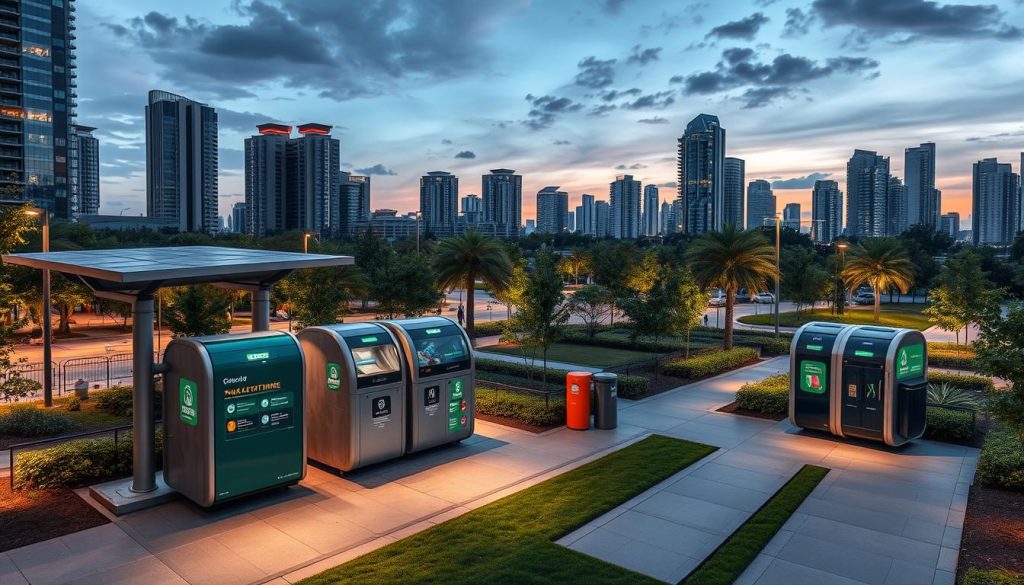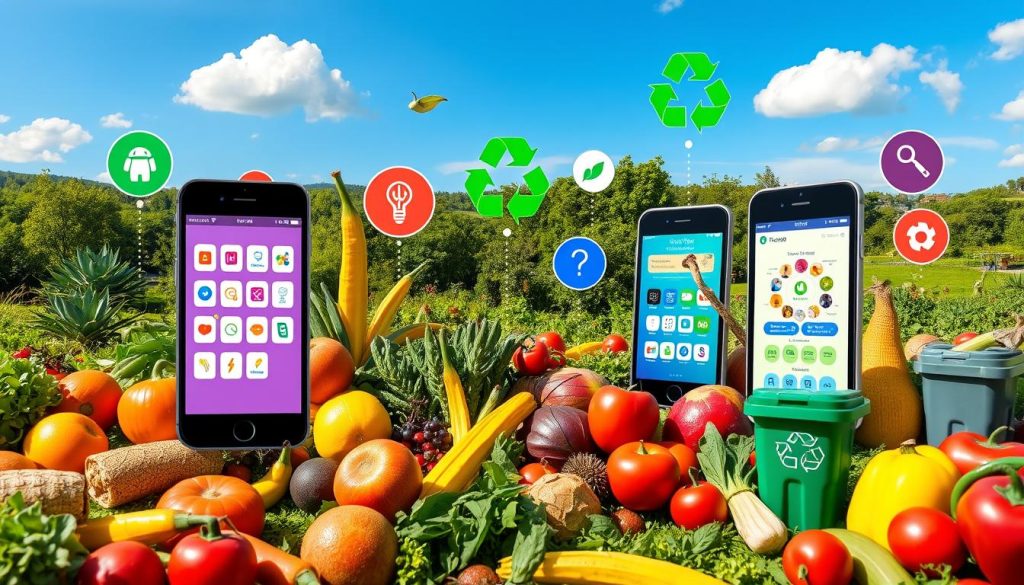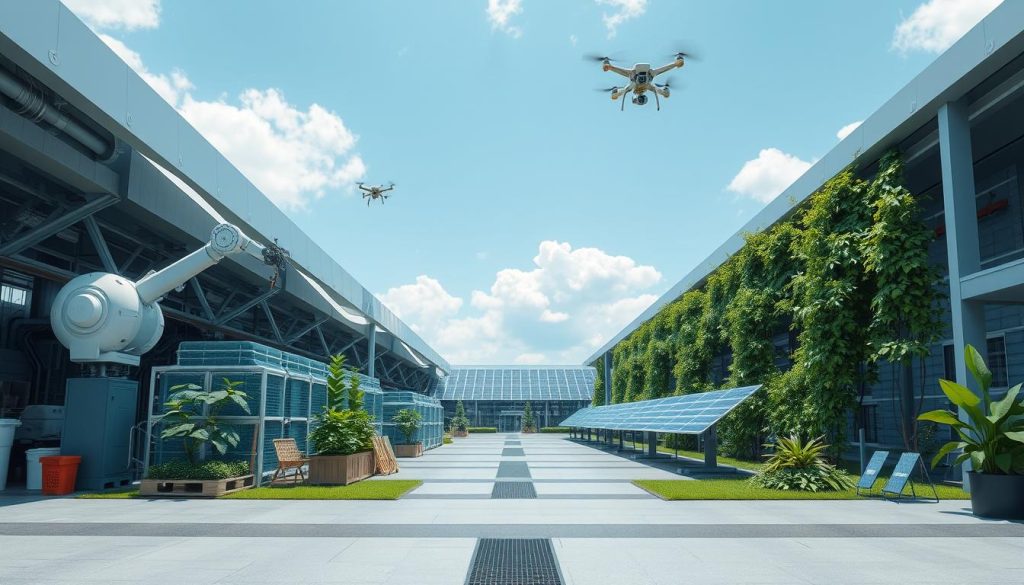Our world is facing big waste problems. We need to use green technology to reduce waste. This helps protect our environment and saves resources.
There are many new ways to deal with waste. We have recycling, composting, and turning waste into energy. These ideas are changing how we manage waste. They help make our planet healthier for the next generations.
Let’s look at how these advanced solutions can change waste management. They aim to make our future more sustainable.
Understanding the Importance of Waste Reduction
As I started exploring sustainable living, I learned how crucial reducing waste is. It’s not just about avoiding plastic straws or using reusable bags. It’s a deeper journey that changes how we think about using things.
My Journey into Sustainable Living
My sustainable living journey began with small changes. I started using a reusable coffee cup and avoiding single-use plastics. These simple steps grew into a bigger commitment to sustainability.
I learned that reducing waste means being mindful every day. It’s about the food we buy and how we throw away packaging.
Why Our Waste Problem Matters
The environmental impact of waste is a big problem we can’t ignore. Every year, millions of tons of waste fill our landfills. This waste not only takes up land but also pollutes and harms our environment.
Fixing our waste problem is key for a sustainable future. It’s not just about what we do individually. We need to work together and find big solutions. By doing this, we can protect our planet for the next generations.
| Country | Annual Waste Generation (Tons) | Recycling Rate |
|---|---|---|
| United States | 292.4 million | 32% |
| Germany | 50.9 million | 66% |
| Japan | 45 million | 21% |
Understanding and tackling waste reduction is vital. By adopting sustainable habits and pushing for policy changes, we can make a big difference. Together, we can create a cleaner, healthier world.
Innovative Technologies for Waste Management

New technologies are changing how we manage waste. They include smart recycling bins and waste-to-energy systems. These innovations help reduce waste and support sustainability.
Smart Recycling Bins
Smart recycling bins are a big step forward. They use sensors and AI to sort recyclables. Cities like San Francisco and Berlin have started using them.
These bins track waste in real-time. This gives cities valuable data. It helps them understand and improve recycling habits.
Waste-to-Energy Technologies
Waste-to-energy technology is another game-changer. It turns non-recyclable waste into energy like electricity or heat. Cities like Copenhagen and Tokyo are leading the way.
These plants reduce the need for landfills. They turn waste into a valuable resource. This helps create a more sustainable future.
| Technology | Key Benefits | Implementing Cities |
|---|---|---|
| Smart Recycling Bins | Enhanced sorting, real-time tracking, improved recycling rates | San Francisco, Berlin |
| Waste-to-Energy | Reduces landfill use, converts waste to energy, sustainable waste conversion | Copenhagen, Tokyo |
How IoT is Transforming Waste Reduction
The Internet of Things (IoT) has changed how we manage waste. It brings new solutions to reduce waste and make things more sustainable.
Real-Time Waste Monitoring Systems
IoT has led to real-time waste monitoring systems. These systems use sensors to track waste levels and plan collections. This makes waste collection more efficient, as trucks only go when needed.
Benefits of IoT in Waste Management
IoT in waste management has many benefits. It helps use resources better and cuts down on emissions from transport. It also gives us accurate data on waste patterns.
My Favorite IoT Applications for Sustainability
There are many IoT apps that help the environment. Smart bins with sensors are my favorite. They tell waste services when they need to be emptied, reducing mess.
Autonomous robots that sort waste are also great. They use digital tools to separate recyclables from trash. These apps make waste management better and more efficient.
Using Apps to Minimize Food Waste

In today’s world, it’s easier to be eco-friendly thanks to apps that fight food waste. These apps help us use food more efficiently. They offer smart ways to cut down on waste in our daily lives.
Meal Planning and Grocery List Apps
Meal planning apps are a big help for busy families. They help you plan meals and make grocery lists to avoid buying too much. Apps like Mealime and Yummly let you pick meals based on your diet and make lists for shopping.
This approach not only cuts down on waste but also saves money on groceries.
Food Donation Platforms
Food donation apps are great for reducing waste. They connect people and businesses with local food banks and charities. This makes it simple to donate extra food to those who need it.
For example, Olio lets communities share food with neighbors. It promotes kindness and helps the environment.
Apps for Selling or Sharing Surplus Food
Apps like Too Good To Go and Imperfect Foods let you buy and sell food at lower prices. They offer a place for restaurants, stores, and people to sell extra food. This reduces waste and gives buyers a chance to save money.
These apps give food a second life, making a big difference in sustainability.
| App Name | Main Function | Notable Features |
|---|---|---|
| Mealime | Meal Planning | Customizable meal plans, grocery lists |
| Yummly | Meal Planning | Recipe recommendations, dietary preferences |
| Olio | Food Donation | Community sharing, local food banks |
| Too Good To Go | Surplus Food Sales | Discounted surplus food, various sellers |
| Imperfect Foods | Surplus Food Sales | Affordable food options, reduce food waste |
The Role of Artificial Intelligence in Waste Reduction

Artificial intelligence is changing waste management for the better. It’s making recycling faster and more effective. I’ll explain how AI is making a big difference.
AI-Powered Sorting Systems
AI waste sorting technology uses machine learning and computer vision. It makes sorting recyclables quicker and more accurate. This smart method cuts down on contamination and makes sure valuable materials are used again.
Predictive Analytics for Waste Generation
AI also helps predict how much waste will be generated. It looks at past data to guess future waste amounts. This helps cities and businesses plan better, keeping places clean and tidy.
| AI Application | Function | Benefits |
|---|---|---|
| AI-Powered Sorting Systems | Automated sorting of recyclables using machine learning and computer vision | Increased accuracy, reduced contamination, and efficient resource recovery |
| Predictive Analytics for Waste Generation | Forecasting waste volumes using historical data | Optimized resource allocation and waste collection schedules |
Eco-Friendly Packaging Solutions
The need for sustainable packaging is growing fast. This change helps reduce waste and promotes a greener future. Today, we explore two key advancements: biodegradable packaging and reusable solutions.
Biodegradable Packaging Alternatives
Biodegradable packaging, made from plants, is becoming popular. Brands like Evian and Coca-Cola are using biodegradable materials for their products. These materials break down easily, offering a solution to packaging waste.
Reusable Packaging Innovations
Reusable packaging is also on the rise. Companies like Loop and EcoEnclose are introducing smart systems for reuse. These systems are designed to be returned, cleaned, and refilled many times. This approach aims to cut down on single-use products and waste.
| Company | Innovation | Environmental Impact |
|---|---|---|
| Evian | Biodegradable Bottles | Reduction in plastic waste |
| Coca-Cola | Plant-Based Packaging | Less environmental toxin |
| Loop | Reusable Packaging System | Decreases single-use waste |
| EcoEnclose | Return, Reuse, Refill | Promotes sustainable packaging |
Using biodegradable and reusable packaging can greatly reduce waste. Together, consumers and companies can make a big difference. Our efforts will help create a cleaner, greener planet.
Personal Tips for Joining the Waste Reduction Movement
Joining the waste reduction movement takes commitment and simple steps in our daily lives. Here are some sustainable living tips that have made a big difference for me. They’re easy to add to our daily routines.
My Top 5 Sustainable Practices
- Reduce Single-Use Plastics: Use reusable bags instead of plastic ones. Choose metal or bamboo straws over plastic.
- Composting: Turn kitchen and yard waste into compost to make soil better.
- Secondhand Shopping: Buy clothes and furniture from thrift stores. It reduces waste and supports the circular economy.
- Reusable Containers: Use glass or stainless steel containers for food instead of plastic.
- Energy Conservation: Use less energy by choosing efficient appliances and turning off electronics when not in use.
These sustainable living tips have greatly reduced my waste. They also help save resources and lower my carbon footprint.
Joining Local Community Initiatives
Getting involved in community waste initiatives can make a bigger difference. It also builds a culture of sustainability in your area. I’ve found it gives me a sense of belonging and purpose.
- Community Cleanups: Help keep parks, streets, and beaches clean by joining local cleanups.
- Recycling Drives: Take part in recycling drives to help the environment.
- Workshops and Seminars: Learn about composting, upcycling, and waste management at workshops.
- Local Farming Initiatives: Support urban farming to cut down on food miles and promote local produce.
- Zero Waste Groups: Join groups on social media or in person to share ideas and support each other.
Working with others in community waste initiatives has really boosted my motivation. It lets me contribute more to the waste reduction movement.
Future Trends in Tech for Waste Reduction
The future of waste management looks bright with new technologies. These innovations will make waste handling more efficient and reduce harm to the environment. I’ll explore these emerging technologies, the importance of policy in supporting them, and my dream for a cleaner tomorrow.
Emerging Technologies to Watch
Automated waste sorting systems are on the horizon, thanks to robotics and machine learning. They can sort recyclables from trash with high precision. Biotechnology could also lead to materials that break down faster, reducing landfill use.
Blockchain technology is another game-changer. It ensures waste tracking is transparent and efficient. This boosts recycling rates and makes waste management more accountable.
The Role of Policy in Tech Adoption
Policy is key to adopting new waste management technologies. Governments help by offering subsidies, tax breaks, and strict environmental laws. Without this support, green tech struggles to gain traction.
Strong policies and practices encourage the use of eco-friendly technologies. This collective effort can lead to a more sustainable future.
My Vision for a Waste-Free Future
I envision a future where waste is a thing of the past. This dream relies on constant tech innovation and community dedication. With smart infrastructure and the right policies, everyone can help manage waste sustainably.
By embracing these technologies and pushing for supportive policies, we can create a better world. It’s a cycle of innovation and adoption that leads to a greener tomorrow.

